Kupala Night
Kupala Night, (Belarusian: Купалле, Polish: Noc Kupały, Russian: Иван-Купала, Ukrainian: Івана Купала), also called Ivanа-Kupala, is a traditional Slavic holiday that was originally celebrated on the shortest night of the year, which is on 21-22 or 23-24 of June (Czech Republic, Poland and Slovakia) and in Eastern Slavic countries according to traditional Julian calendar on the night between 6 to 7 July (Belarus, Russia and Ukraine). Calendar-wise, it is opposite to the winter holiday Koliada. The celebration relates to the summer solstice when nights are the shortest and includes a number of Slavic rituals.[1][2]
| Kupala Night | |
|---|---|
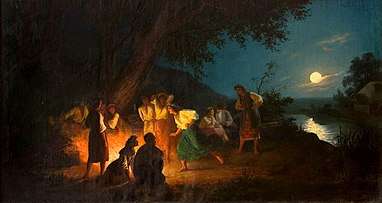 Night on the Eve of Ivan Kupala, by Henryk Hector Siemiradzki | |
| Also called | Feast of St. John the Baptist; Иван-Купала; Купалле; Іван Купала; Noc Kupały |
| Observed by | Slavic people |
| Significance | celebration relates to the summer solstice |
| Date |
|
| Related to | Summer Solstice, Nativity of St. John the Baptist |
History
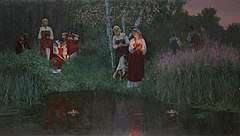
The name of the holiday was originally Kupala; a pagan fertility rite later adapted into the Orthodox Christian calendar by connecting it with St. John's Day which is celebrated on 24 June.[3] Eastern Christianity uses traditional Julian calendar which is misaligned with actual solstice; 24 June in Julian calendar falls on 7 July in more modern Gregorian calendar.[2]
The Ukrainian, Belarusian and Russian name of this holiday combines "Ivan" (John, in this case John the Baptist) and Kupala which was thought to be derived from the Slavic word for bathing, which is cognate. However, it likely stems from the proto-Slavic kump, a gathering. The two feasts could be connected by reinterpreting John's baptizing people through full immersion in water. However, the tradition of Kupala predates Christianity. The pagan celebration was adapted and reestablished as one of the native Christian traditions intertwined with local folklore.[4]
The holiday is still enthusiastically celebrated by the younger people of Eastern Europe. The night preceding the holiday (Tvorila night) is considered the night for "good humour" mischiefs (which sometimes would raise the concern of law enforcement agencies). On Ivan Kupala day itself, children engage in water fights and perform pranks, mostly involving pouring water over people.
Folklore and Slavic religious beliefs
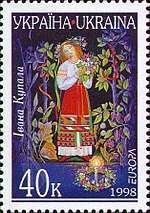
Many of the rites related to this holiday are connected with the role of water in fertility and ritual purification. This is due to the ancient Kupala rites. On Kupala day, young people jump over the flames of bonfires in a ritual test of bravery and faith. The failure of a couple in love to complete the jump, while holding hands, is a sign of their destined separation.
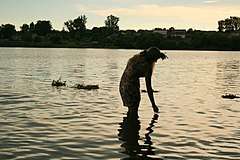
Girls may float wreaths of flowers (often lit with candles) on rivers, and attempt to gain foresight into their romantic relationship fortune from the flow patterns of the flowers on the river. Men may attempt to capture the wreaths, in the hope of capturing the interest of the woman who floated it.
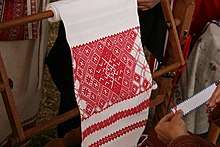
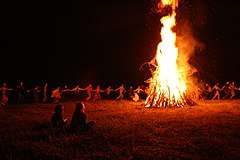
There is an ancient Kupala belief that the eve of Ivan Kupala is the only time of the year when ferns bloom. Prosperity, luck, discernment, and power befall whom ever finds a fern flower. Therefore, on that night, village folk roam through the forests in search of magical herbs, and especially, the elusive fern flower.
Traditionally, unmarried women, signified by the garlands in their hair, are the first to enter the forest. They are followed by young men. Therefore, the quest to find herbs and the fern flower may lead to the blooming of relationships between pairs within the forest.
Ferns are not angiosperms (flowering plants), and instead reproduce by spores; they cannot flower.
In Gogol's story The Eve of Ivan Kupala, a young man finds the fantastical fern-flower, but is cursed by it. Gogol's tale may have been the stimulus for Modest Mussorgsky to compose his tone poem Night on Bald Mountain, adapted by Yuri Ilyenko into a film of the same name.
See also
References
- website "Guide to Russia" Archived 2017-01-09 at the Wayback Machine
- Megre, Vladimir (2008). Rites of Love. Ringing Cedars Press LLC. p. 231. ISBN 9780980181289. Retrieved 2020-07-15.
- Niżegorodcew (et alii), Anna (2011). Developing Intercultural Competence through English: Focus on Ukrainian and Polish Cultures. Warsaw: Developing Intercultural Competence through English: Focus on Ukrainian and Polish Cultures Anna Niżegorodcew , Yakiv Bystrov , Marcin Kleban Wydawnictwo UJ. p. 91. ISBN 9788323384366.
- "/culture_art/traditions". russia-ic.com/. Retrieved 31 October 2014.
External links
| Wikimedia Commons has media related to Ivan Kupala Day. |
- Ukrainian Kupala (alt. Kupalo, Kupailo) traditions
- The Day of Ivan Kupala as it has survived in the Vologda Region
- Kupalle holiday in Belarus (video) on the Official Website of the Republic of Belarus
- Kupala Night in Poland